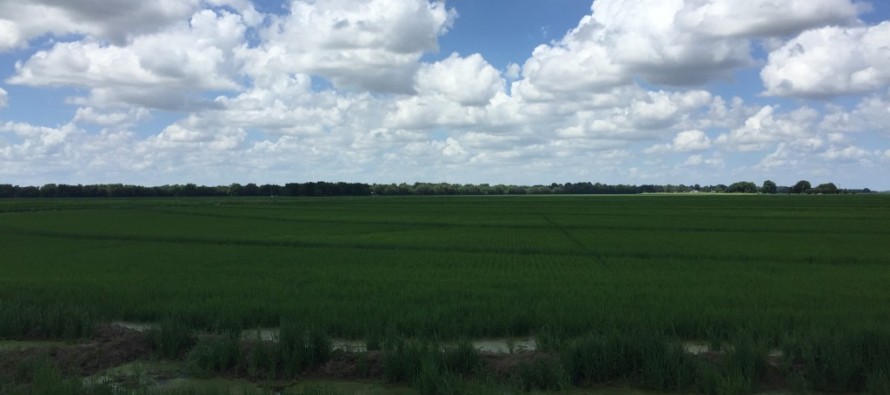Mid-Season Rice Update

I would like to call this a midseason rice update, but in actuality we have rice in Mississippi ranging from one leaf to late boot in places, but most of the rice crop should be at or reaching mid-season. Similar to 2014, our planting progress was spread out from a typical year. Most of the central rice producing counties had favorable weather for a normal April planting, while prolonged wetness in our northern rice producing counties pushed some rice field to plant as late as last week. Early estimates of rice acreage this year put us on pace with last year’s acreage (185,000) to slightly more.
We have encountered several issues this year including drift, environmental induced herbicide injury, and nutritional deficiencies. In general, the number of drift events we have observed this year have been less than in year’s past. But we have encountered glyphosate, paraquat, and imazethapyr on pre-flood stage rice. Most all the cases of drift on rice we have looked at this year have grown out of the drift and are recovering nicely. Similarly, most of the issues we have observed with many rice herbicides “sitting hard” on multiple varieties this year has cleared up as we have received some warm weather and sunshine.
The greatest nutritional issue we have observed in 2015 has been phosphorous (P) deficiency shortly after attempting to establish the permanent flood. The greatest demand for P in the rice plant generally occurs around mid-tillering, and the rapid growth phase of rice development. Many fields we have observed have failed to “jump” and start rapid growth after flood establishment. In most all cases P deficiency was confirmed with both soil and tissue tests. Most P deficiencies in rice can be overcome with 100 lbs of TSP or DAP, depending upon producer preference and market price. The field will need to be drained before application to avoid a scumming issue.
Keep in mind that we are nearing the time when rice blast is beginning to enter into our production system, therefore scout early and often on susceptible cultivars seeded to lighter textured soils. Rice blast has been reported in our neighboring rice producing states over the last several weeks and we received our first call on a blast infected field in Mississippi earlier this week. Best management practices to increase field resistance include reducing dense canopies by proper N fertilization, and reducing seeding rates to help minimize the occurrence of long durations of leaf wetness. Monitoring and maintaining the flood by reducing the areas in a field where flood levels may become low (< 4 inches) has been observed to reduce the risk of blast development. In addition, fungicide applications to manage leaf blast are generally not considered to be economical. Reducing the potential occurrence of neck blast is the most important aspect of managing the disease complex.
Lastly, Mark your calendars if you haven’t already for the Annual rice field day that will be held on July 30, 2015 3:30 pm at Stoneville Capps building. Members of the Mississippi Rice team will be speaking and highlighting many of the issues we have mentioned today and how to properly manage each issue as it occurs on your farms






Let me tell You a sad story ! There are no comments yet, but You can be first one to comment this article.
Write a comment